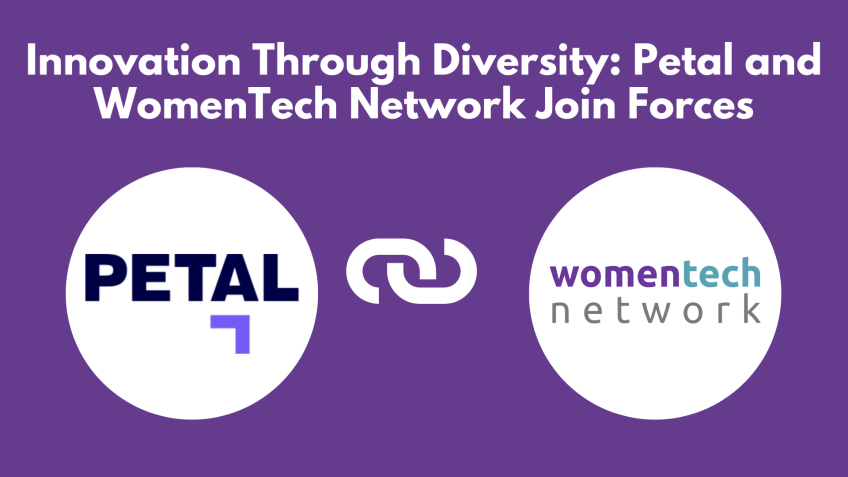The Juggling Act: Navigating the Challenges of Being a Female Leader by Anna Leon
Anna Leon
Partner, Technology Strategy and Digital TransformationNavigating the Challenges of Being a Female Leader in Tech: A Personal Journey
Good morning, everyone and thank you for joining me today for a meaningful conversation on a topic close to many of us - being a female leader in the tech industry. My name is Anna Leon and I work as a partner at KPMG where I overlook digital technology strategy and transformation for the public sector across Canada.
While I can't claim to have a magic crystal ball or all the answers, what I do have to share are some real world experiences that may resonate with many of your own personal stories and journeys.
Introduction
Before we delve into the conversations about overcoming challenges on the road to tech leadership, let me briefly touch upon my personal life. In addition to fulfilling my professional responsibilities, I am also a mother of two beautiful kids, Joshua and Eva. Balancing between these two worlds is a journey in itself, testing me in different ways and teaching me invaluable life lessons each day.
A Funny Misconnection
In fact, a humorous incident from my life that's worth sharing is the time my daughter, Ava, thought I was working for a nail salon because there was one beside our new home called Anna's Nail Salon. It's moments like these that add laughter and much-needed lightness to the journey, making it all the more beautiful.
The Struggles: Tech Industry and Motherhood
Working as a mother and especially in a male-dominated technology industry is challenging. The constant juggle between attending that 3 p.m. meeting and picking up my kid from school is an everyday tightrope walk. The invisible yet palpable pressure to choose between the leadership track and being present for your family can certainly be overwhelming.
Such challenges are not uncommon. Reportedly, up to 50% of women have faced gender discrimination during the hiring process at work and about 22% more women than men reported experiencing imposter syndrome in tech and stem professions.
Facing Imposter Syndrome
Early in my career, I struggled severely with imposter syndrome. It was a real challenge for me to voice my opinion in larger meetings. However, a significant challenge incident forced me to conquer this fear when our customer was struggling with email migrations and the team was facing constant failures.
Breaking the Mould: A Major Turning Point
In one of our meetings, I decided to gather the courage to question if the team was using the right migration technology. The team was downhill from there and it took a considerable amount of determination to convince them about changing the technology to achieve our objectives.
Long story short, my decision paid off, and we successfully completed the migration project. This was a significant breakthrough, forcing me to fight the imposter syndrome and the deeply embedded habit of staying mum. So, I began to actively voice my ideas and opinions, leading to interactions that mattered.
Motherhood and Leadership: The Conjuncture
Interestingly, becoming a mother also played a key role in my leadership journey. It brought balance to my competitive nature and made me more empathetic. Now, my aim is not just personal victories, but collective wins - creating positive momentum for the team and the business.
Key Takeaways
To help you on your journey, here are a couple hacks I swear by:
- Find Your Voice: A simple hack to conquer the fear of speaking up is to initiate meetings. This allows you to practice advocating for yourself and shows confident leadership.
- Ask Right Questions: If you're an established leader looking to inspire, leading by asking the right questions can be your superpower. It can elevate your team and also uncovers unidentified gaps or biases.
Let's remember, seldom does anyone have all the necessary skills and experience for a role. It's a continuous journey of learning, growing, and evolving. Don't shy away from challenges, and always strive for the 'one size up' opportunity.
Finally, appreciate those who support you and continue to be there for you throughout this journey. A supportive spouse, friend, or family is everything.
So that's the end of our session for today. Thank you for your time and I look forward to continuing these conversations with many of you over virtual coffee chats. Don't forget to connect with me on LinkedIn for more such insightful discussions. Let's support each other in our quest for successful careers in tech leadership.
Video Transcription
Thank you. All right, good morning. Good morning, everyone. It looks like folks are starting to join. Um Thank you so much for uh joining the session. I'm really honored to spend the next few valuable minutes with you.Um I'm gonna be talking today about navigating the challenges of being a female leader in tech. Um Many of you are probably wondering, you know, what the struggles um are like and how we can individually uh accomplish, you know, some of the next stages of leadership, especially in the tech industry that is very male dominated. And so I'm not, you know, I don't have all the answers I don't have um you know, a, a magic, you know, crystal ball, but I do have uh some real world experiences that I'm really happy to share with you. And hopefully my experience can really resonate with some of your own personal stories and your own personal journeys as well. All right. Um So let's advance to the next slide. So, um as I mentioned, I'm Anna Leon. I work today as a partner at KPMG. I'm responsible for leading digital technology strategy and transformation for the public sector across Canada. And uh so these are just some photos of me and my kind of my day to day job.
Um I also work with the KPMG cycling team and we uh try to do at least once a year. We try to go across uh Toronto to Niagara Falls on an effort to raise funds for the Princess Margaret Hospital. Um And then the next slide I, I want, I really wanna just talk a little bit about um my family and uh being a mom, you know, we uh you know, I'm a mom to two great kids. My son, Joshua, who's a kind of a broody, teenage, cruel, teenage, 13 year old and then my daughter Eva who's uh 10 going on 17. And uh when they were little, how I explained my professional role to my career. My, my kids when, when they were little uh was I, I told them mom is kind of like a captain of a high tech pirate ship that navigates the choppy seas of challenges uh that my customers go through and uh we, and you know, my mom and the ship's crew, we try to help our customers find the right treasure.
And uh that treasure is called Digital Transformation. And I remember when I told that to my kids, my daughter kind of inquisitively looked at my, my face and she said, mom, don't you do nails? And I was like, what do you mean, Ava nails? And she said, yeah, don't you do manicures and pedicures? And I realized that my, my daughter thought this whole time that I was uh I was working for a nail salon because we had moved to a new neighborhood. And the reason for the move was to work to, you know, to move closer to mommy's work. And right beside our new home, uh was uh a nail salon called Anna's nail Salon. So my daughter just put two and two together and always assumed that when I was leaving for work that I was going out to, to do nails for people. So anyway, I thought that was really funny. Um You know, it's not easy working as a mom, especially working in the technology industry that's heavily male dominated, but just being a working mom in general is always very difficult because our work is never ever done. Um You know, we are often expected to compartmentalize ourselves and choose between the leadership track in our careers or being present in our families and the pressure to do that could be very, very overwhelming.
Um And this is never overtly stated on any company policy, you don't see it in a poster, in a boardroom. Um But the pressure to accept the 3 p.m. meeting invite or to pick up our kid from school is always an everyday tightrope. And I know there's many of you on the call today, it totally resonates, right? Um You know, up to 50% of women reported experiencing gender discrimination during the hiring process at work. And, you know, many of the contributing factor to the statistics show that women are 22% more likely than men to report experiencing imposter syndrome in tech and stem professions. You know, but I challenge the notion that we have to be one or the other. I I truly believe that, you know, we can try to find the right balance that works for you in, in a unique way to try to be both. Um And I've, I've seen my own transformation journey and I'm really, you know, here to share with you what I've experienced as I've transformed throughout my career. Um You know, my background is I, you know, a, you know, I actually became a second parent to my two younger sisters because our father left when I was at the age of 10. And so our single mom leaned on me heavily uh to help raise our family.
So my two younger sisters and I, um you know, and my mom, we kind of made up our, our kind of our, our unit. Um But it was really difficult because my mom was working full time and I was really responsible for doing kind of the day to day chores of, of taking care of my, my sisters and helping them walk to school back to school, feed them, bathe them, et cetera. So it was a I, I kind of lost my childhood and I just became a, you know, a, a parent right away. Um But what, what's really interesting about, um you know, the, the way that I grew up was, I grew up as a Korean uh from a Korean heritage and a lot of the innate things that are part of that culture is really around the respect for elders and really not testing out uh you know, any statements that your elders make.
You don't ask questions, you accept it verbatim. Um And that was, you know, that was a sign of respect to when you're older, when you're more senior in the company. Um, when you're, um, you know, a parent or an authoritative figure, you never ever questioned and you never voiced out your opinion. So, you know, I grew up in that kind of culture, uh growing up. Um And so by the time I was in high school because I had to take care of my family, I took on two jobs. Uh I was, uh, working as a barista at a coffee shop in Toronto. And I remember like working, you know, many, many evenings after school, like pouring countless coffees. And I would always end up cleaning out the shop and would, would be cleaning the shop until one in the morning to get home. And so, um, and there were countless times I, I'd come home with third degree burns because I would always be spilling coffee on my hands, et cetera. But I needed to do that to support my mom and to help out with life basic things like renting groceries. Uh And then when I turned 19, I had an opportunity to choose between two very different career paths. Uh One was a store manager at a retail shoe store and the other was to join a call center at a major telecom company.
And um I unknowingly kind of stepped into a career that actually perfectly suited my hypercompetitive nature, which was sales. And so I ended up joining um the telecom company as a call center agent. And so early in my career, you know, I, I realized that I loved the drive of winning. I was driven to win and at all costs, and I struggled at a personal level, I struggled uh with speaking up for myself. There was something about the anonymity of speaking to a customer behind a telephone that gave me a sense of confidence. But as soon as I was in a room with other people, that's when my confidence really broke down. And so the way that I tried to make myself noticeable in the in the firm was to be the top sales rep. So I drove myself so hard to win. And so I, I quickly um started to get recognized and I was the top telemarketing salesperson at the time. And uh and then slowly I started to move up to um larger roles. I, I moved up to small business sales rep and then I became the enterprise account executive selling to large corporations for this telecom company. But what the biggest anxiety that I had was I struggled with um imposter syndrome. I struggled with severe anxiety.
I had an inability to speak up and contribute in larger meetings. Um And, and those are things that I knew and innately I knew that those are things that I needed to overcome if I ever wanted to become a leader. And I was so intimidated and I was surrounded by so many very self assured and let's be honest, mostly men um individuals and so the impostor syndrome got the best of me. And I remember working at this telecom company, out of 100 employees, only five of us were men and these were all senior uh account executives that faced uh large corporations. Um And so it was really difficult for us to um you know, find our place in, in the world uh of that big corporation at that time. Um And, and so one of the things that I noticed was I uh I was never really thought of to be invited to lead critical discussions. Um even though I felt like I had all the data points and all the facts to adequately present to a team or a customer. Um And, and because I was raised to be subservient, I really lacked the confidence to advocate for myself.
So whenever there was a customer meeting, they would then identify who's gonna be in the room and who's gonna present what. And I was never ever included in that conversation. And it really, really took me a while to realize that the power to break through was within me. And I had to take the risk by speaking up and to say what I feel and what I think even though I had to fake confidence. And I remember the turning point of when this started was, you know, there was a time when I noticed the team was really struggling with the technical problem and we had gone through the third cut over weekend that failed again. And the team was not successful in migrating any of the thousands of emails that needed to be transitioned for a client. And we had only the weekends to do this transition work. And after losing three valuable weekends, the team was under significant pressure as the entire project needed to be completed by hard rigid, fast approaching deadline. And there were only so many weekends left and with every weekend lost the runway to complete this migration was just getting shorter and shorter.
And after the team, you know, after listening to the team deliberate on, you know, very unnatural ways to force fit a crazy schedule by planning larger and more riskier migration batches with more and more people um failing to meet um failing at another weekend meant that there was unplanned costs that the company would have to sink into this project.
And we would also continue losing credibility with the client. And I realized that the team still didn't know what the issue was and they were yet gonna go into another weekend trying to hope for the best and hope that the migration would, would work magically work. Um And, and they're gonna face the same challenge again. So I really felt nervous and intimidated, but I decided to speak up and I asked the team if they believed that they were using the right migration technology. After a moment of silence, one of the engineers blurted out on how it was the client's chosen technology and that we couldn't change it. And normally I would have just shut myself up and I would have just like nodded and like, let the team continue. But I mustered up more courage. And then I asked if anyone in the room had successful experience with this particular technology, and I was met with blank stares in the room and they were kind of looking at each other. And I realized no, not one person in the room had come across this particular technology. So then I gathered up more, more, you know, confidence. And then I asked them another question. I said, if you, if you had to choose the right technology, which one would it be? And they all had consensus that there was an industry leading tool that should have been used, that was the more obvious choice and it proved to have higher degree of success. Um But it was double the cost of what the client paid for this technology.
And so they started to deliberate on scheduling again. But then I, you know, mustered enough courage to lay out the pros and cons approaching the client. Now meant that, um, you know, meant that you would uh have the opportunity to migrate this client in time, uh versus, you know, uh waiting another failed weekend only to realize that the tool is wrong and then having very little time to make any sort of change. And so I realized that that was something that the team really had to make a decision on right away. And so after some time, um that's when sorry, I'm just messing up with my notes here. That's when um the team realized that I had a point and they realized that that was really the right approach. Um And after a moment, the team agreed and uh they asked me if I'd be willing to approach the client with this approach. And so I thought that this was an opportunity to exercise leadership and really stretch out of my comfort zone. And so even though it was a really difficult step, um and, you know, iii I approached the client and I shared with him that, you know, this is really a point where the client needed to make a decision and opt in for the new technology even if it costed more.
So anyway, long story short, it was a successful migration. Had I not pulled the trigger at that moment, we would have probably failed this project miserably, you know, as women, we tend not to speak out, you know, we don't tend to speak up for promotions. We don't seek uh out uh credit. Uh We feel that we don't have the necessary skills if there was a, a promotion that required 10 skills and we had nine out of the 10. Uh, we would probably, you know, believe that we would not have the ability to, to take on that role. Um, but I always say to my mentees that I, you know, mentor always look for the one size up, you know, uh there's gonna always be roles that we're gonna continue to learn as we live through it. And, you know, in reality seldom does anyone really have all the necessary skills and experience for a role? And so why couldn't any of these opportunities be ours? Um Becoming a mother, uh I believe, made me a better leader. And now I'm not saying that if you're not a mom, you're not a good leader.
I'm just saying that for me, I had a very, very competitive and very harsh side of my, my personality and becoming a mother really drove out a lot of that competitive drive and it elevated much more empathy and prior on what really mattered. And so the real major turning point in my leadership journey was when Joshua was born and it was like he turned my life around in the best possible way and and obviously some challenging one as well, especially as a professional in technology. When I was pregnant with Joshua, I was working for an American firm in Canada. And though I had every right as a Canadian citizen to take my full 12 month mat leave off, I was afraid of losing relevance by being away for too long. And I feared that if my colleagues can run, you know, for six months without me, uh then they could run forever without me. So this was a genuine fear that I had. And so I ended up taking an American mat leave of only three months and my husband took the balance of the parental leave and we did it again three years later with my daughter Ava. And I want to take a moment to acknowledge that having a supportive spouse is everything. Um you know, having a supportive spouse has been a major factor, I believe in my success and I know and recognize that not everyone has that privilege.
So I just want to call out to those of you that are, that are, you know, supported by your spouse is like, take a moment to appreciate them. Um but yeah, you know, it's, it's a real genuine challenge because when colleagues would go out to drinks after work, I would have to go home and pump milk. And I would always worry, I would always worry about losing valuable, you know, professional capital and facetime to grow my nut. And when others were traveling, uh you know, as market leaders and building their brand and taking on high profile speaking engagements. I was rushing home to pick up kids, you know, from school and help them with their homework and drive them to their after school programs. So, you know, I totally get it. But despite these challenges, being a mother has really made me uh more empathetic. It's given me a new lens through which I can view others. Um Being a parent has made me even more laser focused at work. I couldn't afford to always bring homework um as I needed to focus on my kids. And so I had to get my work done efficiently and effectively and along with winning uh kindness took on a new meaning and value for me because I wanted my kids to grow up in an environment where people are kind not just trying to compete and win against each other.
And so as a result of this empathetic shift, I became more interested in the team's collective win rather than my own win. And it's no longer just about me, but it's about creating positive momentum for the team and for the overall business ecosystem, making space for others to win really multiplies and exponentially, uh, reproduces successes. Um, and I, I know that I'm kind of running out of time but I'll leave you with this. Um, there's a, there's two favorite hacks that I have. You know, if you're stepping out in your professional journey as a leader. Um, here's a simple hack to find your voice. You know, you don't need to be a subject matter expert and sometimes voicing out opinions and meetings can be daunting the way that I've, I've started this out is a hack and, and, and what it is is you just have to set the meeting agenda. Um always kick it off and always end, initiate the meeting offer to set it up and send out the invites after the meeting at, at the time of the meeting when everyone has joined the call, kick it off by stating the agenda or purpose for the meeting and then pass it over to the next the first contributor when the call comes to a close, thank everyone and then summarize, what was the discuss and recap the action items and ask attendees if there was anything missed.
This simple hack allows you to use your voice and practice advocating for yourself in your ideas. And this hack also allows you to have a voice in meetings and shows confident leadership. The second thing that I'll end with is if you're an established leader looking to inspire lead by asking the right questions. Um I spent some time with the CIO that was absolutely brilliant and I realized that, you know, asking questions in the right way is the secret superpower of great leadership. And here's why it gives opportunity to elevate your team. It shows vulnerability, you don't have to know all the answers and sometimes you might know, but you're giving an opportunity to others to shine. And it also seeks to confirm and validate your opinions without being confrontational. And it also uncovers any unidentified gaps or biases and it also creates a culture of support, healthy debate. So, um I'm gonna end it here. Thank you so much for being a part of this conversation. Please feel free to connect with me on linkedin. I really do look forward to having conversations and virtual coffee chats with any of you. And so thank you so much for your time and uh I look forward to uh your successful career in tech leadership.






